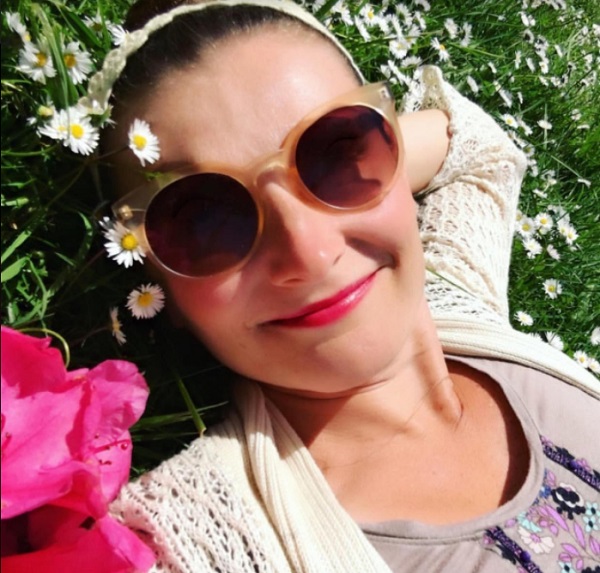
I never thought I’d say this, but my chronic illness is one of the best things to ever happen to me.
Don’t get me wrong, living with a chronic illness was frustrating, painful, and, at times, isolating. Dozens of medications, monthly doctor’s visits, and wasted days spent curled up in my bed self-soothing left me feeling hopeless and scared for my future. I’ll never forget hiding underneath my sweat-drenched sheets wondering if the throbbing in my skull and the ringing in my ears were signs of permanent damage.
There’s no denying it, chronic illness downright sucks. But the process of healing from my illness has been transformative.
Here are seven lessons I learned during my healing process that changed my life for the better, and can hopefully change yours:
1. Pay attention: Our bodies are telling us something.
It took a close friend of mine saying, “You know, you’ve been complaining about body pain a lot,” to realize that my daily aches and discomforts were signs of inflammation and viral infection. Many of us overlook the signals our bodies give us because we’re busy keeping up with the daily barrage of being an adult. Some of us have a habit of ignoring pain altogether.
How can we begin to live with the health and vitality we deserve if we don’t learn to listen to our bodies? Once I began treatment for a bacterial/viral infection, I practiced a daily check-in with myself to initiate a dialogue with my body. I would scan my body to notice symptoms like migraines, brain fog, anxiety, swollen joints, and neck pain. By practicing this kind of awareness, we can gather information, notice systemic patterns, and heal our ailments more quickly.
2. We can heal: Our bodies are designed to heal.
When we get to the root of what ails us—which can be challenging—we regain our power. I noticed that an “I’m sick” mentality slowly and surreptitiously snake-charmed its way into my psyche and spirit. The combination of not seeing immediate results and ending every doctor’s visit with an “I’ll see you in a month” attitude wore away at my hope.
When we consistently feel pain, we forget that our physical bodies are dependent on mental, emotional, and spiritual assistance. Even though the shift is subtle, our immune systems are heightened when we transition from thinking we’re sick (fearful) to knowing that we’re in the process of healing (hopeful). This is not an attempt to dishonor the reality of our ailments and wish our way to wellness. Rather, it’s a way to reintegrate trust, harness the power of our thoughts, and align our bodies with healing.
3. Food is medicine: What we put into our bodies either fights or feeds disease.
I always knew plants, herbs, fruits, and vegetables had nutritional value, but I somehow overlooked their powerful medicinal (antiviral, antibacterial, and antioxidant) qualities. Change is difficult at first. I was resistant to giving up what I considered to be part of my identity: rich food and bottomless drinks. It took time, but I reached a point where I hated feeling like sh*t more than I loved consuming fatty, processed foods. Within six months of switching to a plant-based diet, my symptoms reduced by 75 percent. I was impressed.
The reality is, though, we live in a culture that focuses on treating symptoms and managing illness rather than treating the root problem and preventing disease. If we connect to our heritage and base our diet around foods with an ingredient list that we can actually pronounce, we inevitably transform our health.
4. Take breaths, not pills: Medicine has its place, but doesn’t always bring lasting change.
When used intentionally and with monitoring from a medical professional, pills can be useful tools. Antibiotics, antidepressants, and pain pills, however, aren’t sustainable. For me, lasting change came from connecting to my breath through a meditation practice. Meditation doesn’t have to be formal, and it doesn’t require a cushion or candle. We can meditate while we’re doing the dishes, watering the garden, or folding the laundry. The only requirement is breath and attention.
The practice of being still and mindful increases our emotional, physical, and spiritual well-being, and allows us to connect with the parts of ourselves that we’ve kept hidden for years—the parts that tell us we’re enough. With each deep breath we take, we give ourselves permission to strengthen our innate resources. It may take time—and some tears—but eventually we can heal our suffering. And the best part is that we don’t need a prescription.
5. Be mindful of toxins: There is a direct link between toxins and disease.
Exposure to some toxins may be unavoidable, but learning to reduce our consumption of them is possible. Heavy metals and chemicals can be found in our water supply, food, cleaning supplies, and even the air we breathe. Not so fun fact: high levels of mercury, which can be found in tuna and swordfish, can have toxic effects on the nervous, digestive, and immune systems.
When I switched to drinking purified water, using natural cleaning products, and buying organic produce, I noticed a significant decrease in brain fog, migraines, and memory loss. We can increase our overall well-being significantly by reading labels, familiarizing ourselves with ingredients, and becoming conscious consumers.
6. We are not alone: We need to depend on others for emotional support.
There’s a deep sense of connection and community that evolves when we share our suffering. I used to suffer silently out of fear of judgment and rejection; then a good friend of mine was diagnosed with Lyme Disease and together we found an online community where we could exchange advice, stories, and hope.
It can feel isolating when illness prevents us from enjoying our favorite hobbies, maintaining a social life, or even completing menial tasks, like showering. When we connect with others, we realize sickness doesn’t discriminate. We all feel sadness, fear, pain, and loss. A sense of community lends compassion, empathy, and guidance during our darkest times. Even though the details of our stories make us unique, our feelings connect us universally and help us realize we’re all in this together.
7. Cultivate self-love: It’s the best medicine.
I wasted a lot of time and tears searching for answers outside of myself only to learn that bravery isn’t found in exotic places, fulfillment isn’t served in a bottomless martini glass, and self-worth isn’t created underneath bed sheets. The moment we realize we can stop searching because we already have what we need, is the moment we cultivate self-love.
It’s difficult, but we can become a better version of ourselves when we let go of the things that aren’t serving us. The people-pleasing, the afternoon cocktails, the recreational drug use, the late-night binge fests all stem from a deep longing to feel good enough. Every time we create healthy boundaries, practice self-compassion, and talk to ourselves like we would our best friend, we indirectly give ourselves permission to reclaim our unlimited potential.
We all struggle to heal the parts of ourselves that threaten to break us. We want to regain our health, feel love, and salvage a sense of peace. When I embarked on a journey to rid myself of physical disease, I never expected to gain wisdom that would transform my life for the better.
Our darkest moments may debilitate us, but our path to recovery can strengthen us forever.
~
Relephant:
How to Stop Attacking Yourself: 9 Steps to Heal Autoimmune Disease.
~
Author: Chezarina Moran
Image: Author’s own; Vladislav Muslakov/Unsplash
Editor: Nicole Cameron
Copy Editor: Catherine Monkman
Social Editor: Leah Sugerman








Read 30 comments and reply